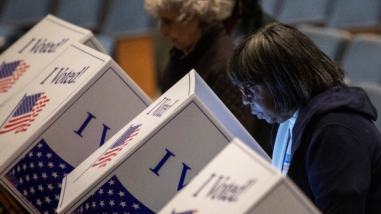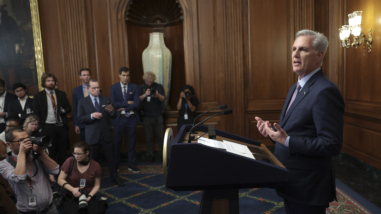Marchers including Representative John Lewis, President Barack Obama, and former President George W. Bush on the Edmund Pettus Bridge commemorate the 50th anniversary of “Bloody Sunday.” (Photo Credit: Official White House photo by Lawrence Jackson)
There is something very powerful about the way a place weighted with history can change one’s perspective. That’s why, for the past fifteen years, the Faith and Politics Institute, a Hewlett Foundation grantee, has organized an annual bipartisan, multi-faith pilgrimage for Members of Congress to commemorate “Bloody Sunday,” a turning point in civil rights history. This year marked the 50th anniversary of that savage attack by white police officers on non-violent African-American demonstrators at the Edmund Pettus Bridge in Selma, Alabama. The images broadcast on television that March day in 1965 into millions of American homes shocked the nation’s conscience. By August, President Lyndon Johnson had pushed the Voting Rights Act through Congress.
Each year, the pilgrimage is led by Congressman John Lewis, a civil rights leader who was badly beaten on Bloody Sunday, and typically he’s joined by a few dozen Members of Congress. This year more than 100 came, including some who weren’t yet born in 1965 and have no personal recollection of what happened there. Yet with amendments to the Voting Rights Act pending in Congress, Selma’s history has rarely been more relevant.
The Faith and Politics Institute delegation, which I had the honor of joining, spent Friday through Sunday in Birmingham, Selma, and Montgomery at panel discussions and ceremonies at sites associated with the civil rights movement. On Saturday, President Obama spoke to 40,000 people before walking with hundreds across the bridge. President George W. Bush attended, as did descendants of Johnson, John F. Kennedy and Robert Kennedy, and survivors of Bloody Sunday, including a 103-year-old woman who had been beaten by police on the bridge 50 years ago.
Some of the Congressional trip’s most emotional moments were in the churches where we heard from men and women who had stood up for freedom in the 1950s and 1960s in the face of hatred and violence. One had been only eight years old when she joined the Pettus Bridge march. They told us about their experiences, and how their entire lives had been affected. We heard from descendants of some who had been killed. And in front of the state Capitol, we heard the daughter of segregationist Governor George Wallace repudiate her father’s legacy with steely determination and describe her work for racial reconciliation.
Congressman Lewis, who was raised near Montgomery, was just twenty-five years old when he joined the march across the Pettus Bridge. Today, much has changed for the better, he told our group: “This is not the Alabama I grew up in.”
In 1965, the majority of the population around Selma was African-American but every registered voter was white. Today, Selma’s mayor and a majority of the city council are African-American. And that same kind of change is reflected in the bipartisan set of legislators who co-hosted this year’s Faith and Politics pilgrimage: Alabama Congresswoman Martha Robey, who is white, and Terri Sewall, the first African-American woman elected to Congress from the state; Tim Scott of South Carolina, the first African-American Senator elected from the South since Reconstruction, and Sherrod Brown, a white Senator from Ohio.
But, as President Obama made clear in his speech, much remains to be done. The 50th anniversary of Bloody Sunday took place as national protests of police killings of African-American men were escalating, and #BlackLivesMatter swelled on Twitter. And as polls show support for Congress at historic lows, The Joint Center for Political and Economic Studies has issued a report, “50 Years of the Voting Rights Act: The State of Race in Politics” highlighting race as an often-overlooked dimension of polarization and hyper-partisanship in American politics today.
As the Congressional trip drew to a close, Rep. Lewis answered questions during a bus ride. One member of the delegation, whose parents had been key figures in the 1960s, reflected on the polarization and division and lack of voting in our country today. “How can people learn not to be afraid?” she asked him.
Rep. Lewis replied: “Listen to your inner self. Don’t talk back to yourself. Listen to the spirit and let the spirit move you. Do the right thing. Just do it.”




